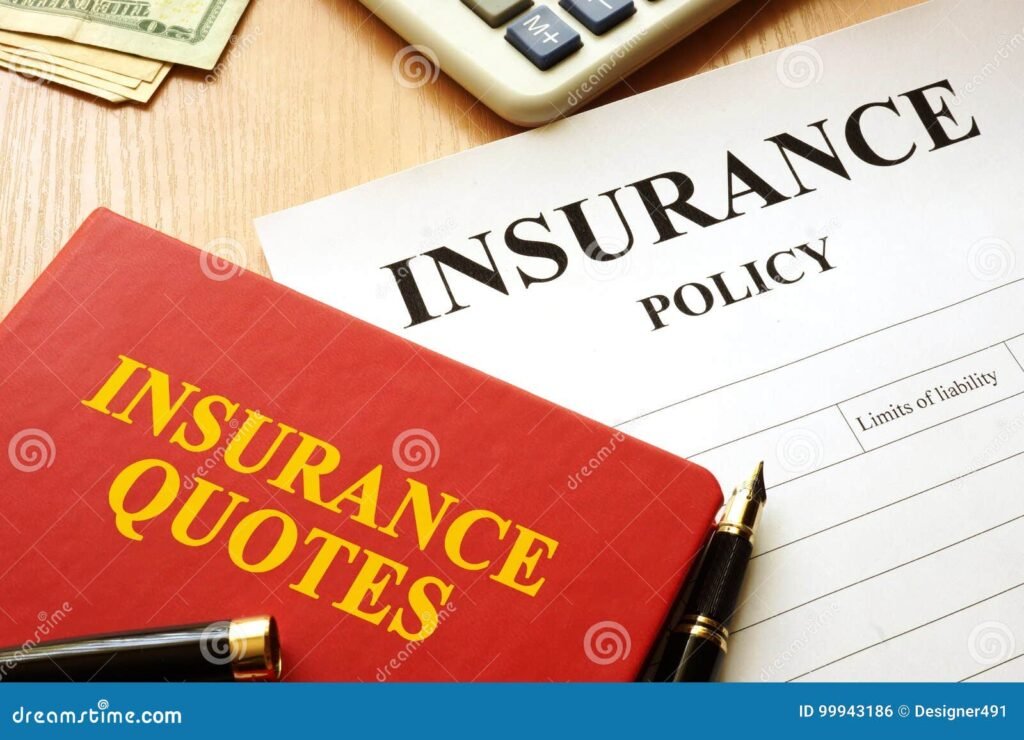Insurance Quote: A Comprehensive Guide to Understanding, Comparing, and Choosing the Right Coverage-futurefootprintsblogs
January 21, 20251. Introduction
In today’s world, insurance is essential to protect your financial well-being and safeguard against unexpected events, whether it’s a car accident, home damage, or medical emergencies. However, choosing the right insurance policy can often feel overwhelming due to the numerous options available. One of the first steps in securing the right coverage is obtaining an insurance quote.
An insurance quote is a preliminary estimate of how much a particular insurance policy will cost based on the information you provide to the insurer. It serves as a snapshot of the coverage options, premiums, and other factors that can influence the cost of your insurance. Understanding how to get, compare, and choose the best insurance quote is critical to ensuring that you get the protection you need at a price you can afford.
This comprehensive guide will walk you through everything you need to know about insurance quotes, from understanding how they work and how to obtain them to comparing and evaluating the best options for you.
2. What is an Insurance Quote?
An insurance quote is an estimate provided by an insurance company outlining how much you’ll need to pay for a specific insurance policy. The quote is typically based on several factors, including your personal information, the type of coverage you need, and other relevant data.
When you request an insurance quote, the provider will calculate the premium based on the information you give. For example, when seeking a car insurance quote, the insurer will consider your driving history, age, and the type of vehicle you drive to determine how much you should pay for coverage.
Insurance quotes are often provided in the following forms:
- Online Quotes: These can be quickly obtained via the insurance company’s website or insurance comparison websites.
- Phone Quotes: You can call an insurance provider directly to receive a quote after discussing your needs with an agent.
- In-Person Quotes: An insurance agent can provide a personalized quote in person after assessing your needs.
The purpose of an insurance quote is to give you a rough estimate of what you would pay for insurance coverage and help you compare various options before making a final decision.

3. Why Do You Need an Insurance Quote?
Getting an insurance quote is essential for several reasons:
– Budgeting and Planning
An insurance quote allows you to assess how much a specific insurance policy will cost, helping you to plan your budget and determine whether the coverage is affordable.
– Comparing Coverage
Insurance quotes give you the opportunity to compare different coverage options, policies, and prices from various insurers, ensuring you find the most cost-effective and suitable policy.
– Transparency
An insurance quote provides a transparent breakdown of what you are paying for. It shows the cost of coverage, deductibles, premiums, and additional services, helping you understand what your policy covers.
– Customized Coverage
Insurance quotes are tailored to your specific needs, meaning you can select coverage levels that match your individual or family requirements. This customization ensures you’re not overpaying for unnecessary coverage or underinsured for essential needs.
4. How Insurance Quotes Work
Understanding how insurance quotes are calculated can help you make informed decisions when seeking coverage. Here’s an overview of how the process works:
4.1 The Process of Getting an Insurance Quote
The process of obtaining an insurance quote typically involves the following steps:
- Provide Your Information: You’ll need to provide personal information, such as your name, address, occupation, and relevant details (e.g., car make and model for auto insurance, health history for health insurance, or property details for home insurance).
- Review Available Policies: Based on the information you provide, the insurer will offer various coverage options, including limits and deductibles.
- Receive the Quote: After evaluating your details, the insurer will provide a quote outlining the estimated cost of the policy.
- Compare with Other Insurers: Once you’ve received a quote, it’s wise to compare it with offers from other companies to ensure you get the best deal.
4.2 Information Needed for an Insurance Quote
The information required to generate an insurance quote can vary depending on the type of insurance. Common details required include:
- Personal details: Age, gender, marital status, address.
- Coverage preferences: Desired coverage amount, policy type, deductible amount.
- Property or vehicle information: For auto or home insurance, details like vehicle model, mileage, or home value are necessary.
- Health-related details: For health or life insurance, medical history, smoking status, and existing health conditions are typically required.
4.3 The Role of Insurance Providers in Quotes
Insurance providers use complex algorithms and historical data to assess risk and calculate insurance quotes. This process includes factoring in data from similar policyholders, industry standards, and your specific risk factors to determine a fair and accurate premium.
5. Types of Insurance Quotes
There are several types of insurance policies, and the quotes for each will vary depending on the type of coverage you need. Here are some of the most common insurance quotes:
5.1 Auto Insurance Quotes
An auto insurance quote estimates the cost of insuring your vehicle. It considers factors such as:
- Your driving history (accidents, traffic violations)
- Age, gender, and location
- Type of vehicle (make, model, year)
- Coverage type (liability, comprehensive, collision)
5.2 Health Insurance Quotes
A health insurance quote is based on your age, health status, lifestyle habits, and the type of coverage you seek. It may include:
- Your medical history (existing conditions)
- Whether you smoke or drink
- Family size and dependents
- Desired deductible and premium amounts
5.3 Homeowners Insurance Quotes
For homeowners insurance, a quote is calculated based on:
- The value and size of your home
- Location (area risks, such as flood or earthquake zones)
- Age and condition of the property
- Coverage limits and deductibles
- Your claims history
5.4 Life Insurance Quotes
A life insurance quote will depend on factors such as:
- Your age and gender
- Health history and lifestyle choices (smoking, drinking)
- The policy type (term or whole life insurance)
- Desired coverage amount
5.5 Business Insurance Quotes
For business insurance, quotes are based on factors like:
- The size and nature of your business
- Industry risk level
- Employee count and roles
- Coverage options (general liability, workers’ compensation, property)
6. Factors Affecting the Cost of an Insurance Quote
Several factors influence the cost of your insurance quote. These include:
6.1 Age and Demographics
Younger individuals may pay higher premiums for life or health insurance due to perceived higher risks. On the other hand, older individuals may face higher premiums due to age-related health issues.
6.2 Driving History (For Auto Insurance)
Your driving history significantly impacts the cost of auto insurance. Drivers with clean records typically receive lower quotes, while those with traffic violations or accidents may face higher premiums.
6.3 Health Status (For Health Insurance)
For health insurance, your current health status, medical history, and lifestyle choices play a large role in determining premiums. Insurers may offer discounts for individuals who maintain healthy lifestyles or have no pre-existing conditions.
6.4 Property Value (For Homeowners Insurance)
The value and condition of your property affect homeowners insurance quotes. Higher-value properties or homes in areas prone to natural disasters may incur higher premiums.
6.5 Business Risk and Industry (For Business Insurance)
The type of business you operate and its risk level will influence the quote for business insurance. For instance, high-risk industries (construction, healthcare) may face higher premiums than low-risk sectors (IT, retail).
7. How to Compare Insurance Quotes
When comparing insurance quotes, it’s essential to look beyond the price and consider the details of each quote. Here’s how to make the best comparisons:
7.1 Comparing Prices and Coverage
- Ensure that you’re comparing the same coverage limits and types across different providers.
- Don’t settle for the lowest price if it doesn’t include sufficient coverage.
7.2 Checking Insurance Limits and Deductibles
Examine the deductibles and policy limits offered by each insurer. A lower premium might come with a higher deductible, meaning you’ll have to pay more out-of-pocket if you file a claim.
7.3 Looking at the Insurer’s Reputation
Research the insurance company’s reputation by reading reviews and checking their financial strength ratings. Look for insurers with a strong track record of paying claims on time.
7.4 Understanding the Fine Print
Carefully read the terms and conditions of the policy to understand what is and isn’t covered. Make sure you know any exclusions or limitations in the coverage.

8. Common Myths About Insurance Quotes
8.1 “The Cheapest Quote is Always the Best Option”
While it may be tempting to choose the cheapest option, the lowest price doesn’t always mean the best value. It’s crucial to ensure that the coverage meets your needs, even if it’s a bit more expensive.
8.2 “I Only Need to Compare a Few Quotes”
It’s essential to compare multiple quotes from various insurance providers. Shopping around ensures you get the best possible deal and coverage for your needs.
8.3 “All Insurance Companies Offer the Same Coverage”
Different insurance providers offer different policy options, coverage limits, and exclusions. Be sure to compare the specifics of each policy before making a decision.
9. Tips for Getting the Best Insurance Quote
Here are some strategies to help you secure the best insurance quote:
9.1 Shop Around for Multiple Quotes
Getting quotes from multiple providers allows you to compare prices and coverage options to find the best deal.
9.2 Understand Your Coverage Needs
Assess your needs carefully to avoid over- or under-insuring. Choose coverage limits and deductibles that make sense for your situation.
9.3 Review Your Policy Regularly
Insurance needs can change over time, so regularly reviewing your policy ensures you have the right coverage as your circumstances evolve.
9.4 Bundle Policies for Discounts
Many insurers offer discounts if you bundle multiple policies (e.g., home and auto insurance) with them. Take advantage of this opportunity to save money.
9.5 Work with an Insurance Agent or Broker
An agent or broker can help you navigate the insurance market and find the best policy for your needs, especially if you’re overwhelmed by the options.
10. Frequently Asked Questions (FAQs)
10.1 How long is an insurance quote valid?
Most insurance quotes are valid for 30 to 60 days, but this can vary depending on the insurer and market conditions.
10.2 Can I get an insurance quote without my credit score?
While some insurers consider your credit score when determining premiums, many offer quotes without it, particularly for certain types of insurance like auto or home insurance.
10.3 Are online insurance quotes reliable?
Yes, online insurance quotes are generally reliable, but it’s essential to provide accurate information to ensure the quote is as accurate as possible.
10.4 What happens if my insurance quote changes after I buy a policy?
If your quote changes after you’ve bought a policy, it may be due to changes in the information you provided or changes in underwriting policies. Review your policy and contact your insurer for clarification.
10.5 Can I negotiate an insurance quote?
While insurance premiums are often based on set criteria, it’s worth discussing discounts or policy adjustments with your insurer. In some cases, you may be able to negotiate a better deal.
11. Conclusion
An insurance quote is an essential tool for understanding the cost of insurance coverage and ensuring you get the protection you need at a price you can afford. By understanding the process, comparing quotes effectively, and knowing what factors influence your premiums, you can make informed decisions and secure the best possible coverage.
12. References
- Insurance Information Institute (III). “How Insurance Works.” www.iii.org
- National Association of Insurance Commissioners (NAIC). “Understanding Insurance Quotes.” www.naic.org
- Consumer Reports. “How to Compare Insurance Quotes.” www.consumerreports.org
